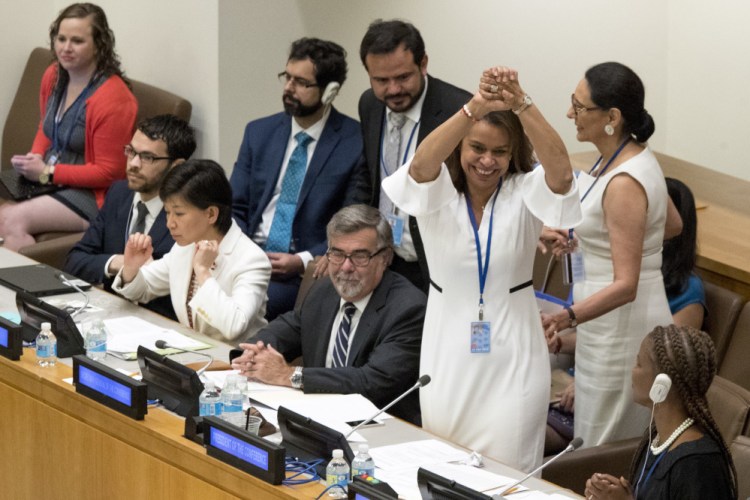UNITED NATIONS – More than 120 countries approved the first-ever treaty to ban nuclear weapons Friday at a U.N. meeting boycotted by all nuclear-armed nations.
To loud applause and cheers, Elayne Whyte Gomez, president of the U.N. conference that has been negotiating the legally binding treaty, announced the results of the “historic” vote – 122 nations in favor, the Netherlands opposed, and Singapore abstaining.
“We have managed to sow the first seeds of a world free of nuclear weapons,” Whyte Gomez said. “We (are) … saying to our children that, yes, it is possible to inherit a world free from nuclear weapons.”
“The world has been waiting for this legal norm for 70 years,” since atomic bombs were dropped on Hiroshima and Nagasaki in August 1945 at the end of World War II, she said.
Setsuko Thurlow, who was a 13-year-old student in Hiroshima when a U.S. nuclear bomb destroyed the city, said survivors “have worked all our lives to make sure that no other human beings should ever again be subjected to such an atrocity.”
“This nuclear ban treaty declares that these weapons are illegal, inhumane and illegitimate,” she said in a statement. “It is the most important step in my lifetime towards the Hibakusha (survivors) goal of totally abolishing all these criminal weapons of mass destruction.”
None of the nine countries known or believed to possess nuclear weapons – the United States, Russia, Britain, China, France, India, Pakistan, North Korea and Israel – is supporting the treaty. Many of their allies also did not attend the meeting.
The United States and other nuclear powers instead want to strengthen and reaffirm the nearly half-century-old Nuclear Nonproliferation Treaty, considered the cornerstone of global nonproliferation efforts.
That pact sought to prevent the spread of atomic arms beyond the five original weapons powers – the U.S., Russia, Britain, France and China. It requires non-nuclear signatory nations to not pursue atomic weapons in exchange for a commitment by the five powers to move toward nuclear disarmament and to guarantee non-nuclear states’ access to peaceful nuclear technology for producing energy.
France’s Foreign Ministry said in a statement after the vote that the country’s security and defense policies is based on nuclear deterrence, just like that of its allies and other close partners, and it has no intention of complying with the treaty.
“It is a text unsuited to the international security context, characterized by growing tensions and the proliferation of weapons of mass destruction, as shown, inter alia, by the North Korea nuclear threat,” the ministry said.
All NATO members boycotted the negotiations except for the Netherlands, which has U.S. nuclear weapons on its territory and was urged by its parliament to send a delegation. It was the only country to vote against the treaty.
Whyte Gomez said 129 nations signed up to take part in drafting the treaty, which represents two-thirds of the 193 member states.
She added that it will be opened for signatures in September and come into force when 50 countries have ratified it, and that its language leaves the door open for nuclear weapon states to become parties to the agreement.
The treaty requires of all ratifying countries “never under any circumstances to develop, test, produce, manufacture, otherwise acquire, possess or stockpile nuclear weapons or other nuclear explosive devices.”
It also bans any transfer or use of nuclear weapons or nuclear explosive devices – and the threat to use such weapons.
Iran, which signed an agreement with six major powers in 2015 to rein in its nuclear program, was among the countries that voted for the treaty. Its representative stressed the importance of the treaty’s prohibition on threatening to use nuclear weapons.
Palestine is recognized as a non-member observer state of the United Nations, and its ambassador, Riyad Mansour, said he was “so proud” to participate in drafting the treaty and voting to adopt it.
Rebecca Johnson of the London-based Institute for Disarmament Diplomacy, called the treaty “the first step to prevent a handful of militaries holding the world hostage with their nuclear arsenals.”
“We will use (the ban) to stop further nukes being made, used or deployed,” she said. “We’ll make it into a formidable lever to accelerate their irreversible elimination, weapon by weapon and country by country.”
North Korea’s nuclear and ballistic missile tests, including its July 3 launch, have become a timely argument for proponents and opponents of the treaty to ban atomic weapons.
Beatrice Fihn, executive director of the International Campaign to Abolish Nuclear Weapons, said 15,000 nuclear weapons around the world have not deterred Pyongyang’s nuclear ambitions and a new approach is needed, starting with prohibition as a first step.
U.S. Ambassador Nikki Haley said on March 27 when talks began on the treaty that “there is nothing I want more for my family than a world with no nuclear weapons, but we have to be realistic.”
But she asked whether anyone thought North Korea would give up its nuclear weapons, arguing that Pyongyang would be “cheering” a nuclear ban treaty and Americans and others would be at risk.
Copy the Story LinkSend questions/comments to the editors.



Success. Please wait for the page to reload. If the page does not reload within 5 seconds, please refresh the page.
Enter your email and password to access comments.
Hi, to comment on stories you must . This profile is in addition to your subscription and website login.
Already have a commenting profile? .
Invalid username/password.
Please check your email to confirm and complete your registration.
Only subscribers are eligible to post comments. Please subscribe or login first for digital access. Here’s why.
Use the form below to reset your password. When you've submitted your account email, we will send an email with a reset code.